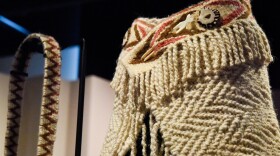All around us, people are quietly taking care of disabled relatives, day in and day out. The stress, sacrifice and rewards of that life are the focus of a new documentary called "Undersung," which is a collaboration of retired University of Washington poet Heather McHugh and filmmaker Adam Larsen. The film premieres this Sunday at the DOXA Documentary Film Festival in Vancouver, B.C.
In 2009, McHugh won a MacArthur Foundation “Genius Grant” for her poetry, and she used the money to start a nonprofit called Caregifted, which provides getaway vacations to people who have spent a decade or more taking care of a severely disabled family member. McHugh said she was motivated to start Caregifted after her godson’s first baby was born with a condition that would prevent the child from ever learning how to walk, talk or feed herself.
“I became interested in that community because I saw how their lives changed overnight,” McHugh said. “I was particularly interested in the unseen caregivers who stand behind the wheelchair, who all night long may be dealing with digestive problems, or washing, dressing and taking care of someone day and night who can’t do it for himself,” she said.
The film follows the day-to-day lives of four caregivers who have received respite vacations from Caregifted. Each has a grown child with severe disabilities.
McHugh said collaborating on the film helped dispel some preconceived notions she had about what life was like for full-time caregivers.
Misconceptions
“My misconception was that it would be crushingly difficult all the time,” McHugh said. “I didn’t foresee, though I should have as a human being who’s open to richness of experience, how much they had to teach me about love.”
The film captures intimate moments of love and tenderness. In one scene, a woman named Claire is sitting at a table with her wheelchair-bound daughter, Sophie, who suffered a debilitating stroke in childhood. All of a sudden, the song “Happy” by Pharrell Williams starts playing on the computer, to their mutual delight.
“You see a smile come on each of their faces and they start doing this dancing in their chairs, and both of them are in chairs at that moment, so there’s no sense of difference,” McHugh said. “That’s one of my favorite points in the film.”
Bringing Recognition
McHugh wants to bring recognition to people making these sacrifices and help them feel less isolated.
“I’m so admiring of them, and I think it really helps them to hear how admirable it is,” she said.
She said each of us can help simply by stopping to talk with someone pushing someone else in a wheelchair “instead of averting your eyes very fast because you’re embarrassed or you’re afraid of making them feel conspicuous. There’s no way your glance can make them more conspicuous than life has already made their situation conspicuous. What they need is what everybody needs – human contact.”







